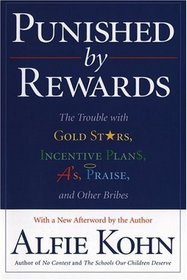BE WEARE READER.... This is a scary book by someone who meddles in psychology and who wants to test it on your kids, BELIEVING wholeheartedly and good intentionally that this is the better way. Better then the tried way it things have been done since creation. Now dont get me wrong, sometimes it is a good thing to question the old ways and to carve new paths. But experimenting on kids and raising little Narcissistic self centered uni-social "my feelings override your facts" is not the way to go.
This book tells the you, to take away this message -
Q/Summarized: that you *should* actively comment on how you NOTICE your child's hard-work, efforts, abilities, strengths, eg "you've drawn a very colorful picture, tell me about it" "you climbed right up to the top all by yourself!" And direct your child to how they might feel "Wow! You must feel so proud of yourself"...
Q/Summarized: However, do try and try as hard as you can not to JUDGE their work with a "well done" "good job" "it's beautiful" or other similar compliment (even though it's a "positive" judgement) - because ultimately you want your child to learn not to rely on other people's praise, even yours, but to assess their own work and to be able to be proud of themselves even when the external praise doesn't come. If not they will never really be satisfied until every last person approves of their work, you want them to be happy with their own approval. You also don't want their brains to get a kick from praise because it will quickly rely on it (praise is essentially verbal/social reward) because it quickly forms a neuro-transmitter addiction - so they slowly lose the ability to feel our human natural internal reward for the things they learn and the things they do since it is overtaken for the need for more addictive external reward.
Your actions, your attention and your look of pride will tell them all they need to know on these occasions - so use these occasions to direct your child's attention to how they might feel IN THEMSELVES, how they should feel self-pride and enjoy their moment.
END OF SUMMARY
As you can see any psychologist can tell you this is a perfect handbook on how to raise a selfish brat at best or a psychotic Narcissist at worst.
Conclusion:
Behavioral approaches are complex. The problem is, children aren't puppies and relationships matter as much as tangible rewards. For insecure, deprived children, with the potential for highly disruptive behaviour, stickers and detentions just don't work in the long term. In many schools poor behaviour is blamed on teachers not implementing the rewards/sanctions policy properly, This book suggests that the rewards/sanctions policy is to blame. My own experience suggests that building relationships with children works far better a specially if combined with the rewards approach - children don't misbehave nearly so much if they feel valued and know you enjoy spending time with them. When stickers do work, it's not because they got a sticker, it's because someone they respect and whose regard they want gave it to them.
This book tells the you, to take away this message -
Q/Summarized: that you *should* actively comment on how you NOTICE your child's hard-work, efforts, abilities, strengths, eg "you've drawn a very colorful picture, tell me about it" "you climbed right up to the top all by yourself!" And direct your child to how they might feel "Wow! You must feel so proud of yourself"...
Q/Summarized: However, do try and try as hard as you can not to JUDGE their work with a "well done" "good job" "it's beautiful" or other similar compliment (even though it's a "positive" judgement) - because ultimately you want your child to learn not to rely on other people's praise, even yours, but to assess their own work and to be able to be proud of themselves even when the external praise doesn't come. If not they will never really be satisfied until every last person approves of their work, you want them to be happy with their own approval. You also don't want their brains to get a kick from praise because it will quickly rely on it (praise is essentially verbal/social reward) because it quickly forms a neuro-transmitter addiction - so they slowly lose the ability to feel our human natural internal reward for the things they learn and the things they do since it is overtaken for the need for more addictive external reward.
Your actions, your attention and your look of pride will tell them all they need to know on these occasions - so use these occasions to direct your child's attention to how they might feel IN THEMSELVES, how they should feel self-pride and enjoy their moment.
END OF SUMMARY
As you can see any psychologist can tell you this is a perfect handbook on how to raise a selfish brat at best or a psychotic Narcissist at worst.
Conclusion:
Behavioral approaches are complex. The problem is, children aren't puppies and relationships matter as much as tangible rewards. For insecure, deprived children, with the potential for highly disruptive behaviour, stickers and detentions just don't work in the long term. In many schools poor behaviour is blamed on teachers not implementing the rewards/sanctions policy properly, This book suggests that the rewards/sanctions policy is to blame. My own experience suggests that building relationships with children works far better a specially if combined with the rewards approach - children don't misbehave nearly so much if they feel valued and know you enjoy spending time with them. When stickers do work, it's not because they got a sticker, it's because someone they respect and whose regard they want gave it to them.




